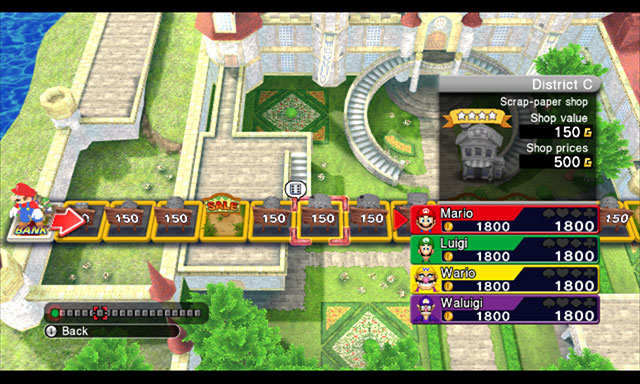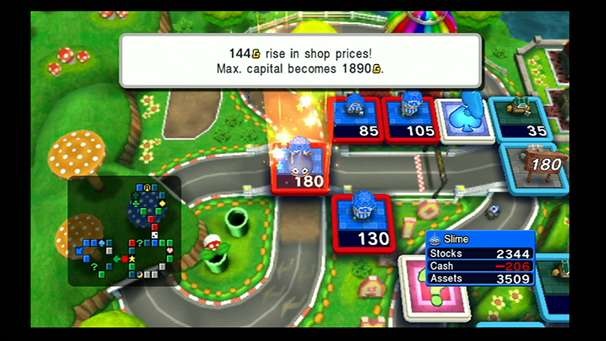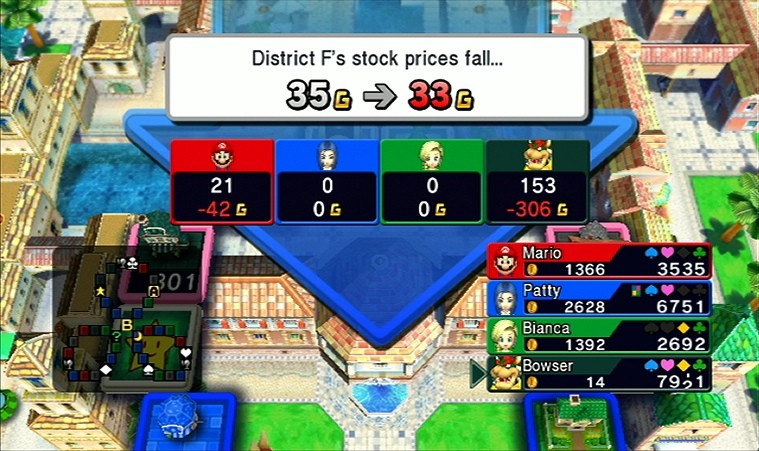Last updated on January 24, 2014
Since snow descended on my town, my weekend ended up a Fortune Street marathon of sorts (at least from my reckoning). Given that, I figured I could amend my previous review of the game while adding a few notes to the process.
1. Don’t Play This Like a Real Investment Portfolio
Fortune Street’s a video game. Thus, the rules that apply to real investment do not necessarily apply here. For example, Fortune Street makes it impossible to invest on margin; you may only use the assets you own. Assets can’t be given to you by other players; you must make a deal or create said assets yourself (or the AI will give them to you).

With that said, optimal strategies usually involve obtaining many properties, especially in the same district, or buying stocks in districts with lots of investment potential (which the game, according to its tips box, calls “freeloading”). However, there’s a neat trick: you can investment more money than you have into a property. So let’s say you have 500g and invest 999g. This will still increase the property’s value that 999g amount, and put you 499g into debt. Still, assume further that you have 2000g worth of stock in that property’s district worth 10g a piece. You can see where this is going: by investing, you increase the stock price of stock you own and then sell it back to the bank to pay off the debt. Since stock value changes occur at the end of a turn, this can happen over and over again. Yes, this totally works, and in real life this isn’t often an option. Use and abuse it. Play it like a game, that is unrealistically, and winning is often within sight.
2. …Except in Certain Situations
Sometimes the game deals you a bad hand at the beginning of a game; that’s just an inevitability. Far as I know, the dice rolls definitely aren’t random, but you take what the game gives you! Still, it’s possible to eke out a win with the proper knowledge of the board. If you find yourself without many properties, one of the best ways to still become a threat comes in diversification of your investments. Invest everywhere you can, as early as you can; your wide array will make it impossible for other people to invest without also benefiting you. Of course, this also means you can screw them over once they get near the win, so do that too!
Being risk averse proves helpful in certain situations. Say that someone owns all the properties near the bank and you find yourself with a full suit. You need that money, but the game gives you a roll that will cost you more money than you can bear. What to do? Just go another way! You might find yourself with the ability to invest in your own stuff (if not buy stock, but certain boards let you buy stock on spaces other than the bank), or even something random and magical could happen on a Venture or suit square. You never know what a conservative play might do!
3. Buy Vacant Lots First!
Like most Fortune Street strategies, this is situational, mostly in the early game. If there’s a Vacant Lot, buy that first. Not only will it count against your domination of a district (and increase stock and property prices if you buy both), they can offer a multititude of strategic options for 200g. A Checkpoint will siphon money every time someone passes by the square, starting at 10g and increasing everytime someone passes; a Tax Office will take 10% of someone’s net worth when they land on it, and give you 5% of yours when you land on it. There are others too, such as teleportation spaces and set price options. If you’ve got the cash, spend 1000g to plop a shop on there and raise the stock price higher (there’s also a glitch here to abuse the game mechanics, but I’ll just leave it at that). In the end , you’ll be sorry when you don’t buy them, especially given the early advantage they can provide.

4. Avoid Domination At All Costs
Domination is the state where someone owns all the shops in a district. This massively increases the property values AND allows for massive investment opportunity to those properties (I think it’s double what you get with one less than the max, if not more). Part of what makes them so dangerous comes from landing on a fully maxed-out property, or allowing someone with 200+ stocks in said district to invest, thereby raising their stock prices to INSANE levels. That’s a game winning strategy!

Of course, you can’t really prevent this if two people exchange to do it, but there’s ways to prevent it. For example, a person with loads of ready cash may just buy out that last property; if you happen to own it, investing to the max capital will make the buyout egregiously high (it starts at 5x the start value, so that is quite a cost). Buy outs are a sunk cost, so the money they use disappears from the game entirely; if they are going to buy you out, at least make a deal with them to get the cash. Motivate others to invest in their properties, and you can prevent a massive blowout on the stock front or properties that immediately bankrupt someone when they land on them.
Of course, if you’re the beneficiary with said Domination, then go for it if you’ve already got a massive stock investment in there. That’s a game winner if you pull it off right.
5. Sometimes You Will Lose, and That’s OK
At a point in time, a losing situation without any hope will occur (especially against the scurrilous AI, which will make you feel like you’re terrible at the game with its hilarious beneficial dice rolls). This happens, don’t worry about it, and keep playing. I have seen a person go from last place to first in an instant, all due to good long-term planning while no one’s paying attention. Still, some situations will cause desperation, as did the last game I played. In the end, you can just accept it and prevent the other players from winning in the most annoying ways possible! At least you can learn something from the loss.
And hey, there’s always next time! You, too, could make a fortune on Fortune Street!


